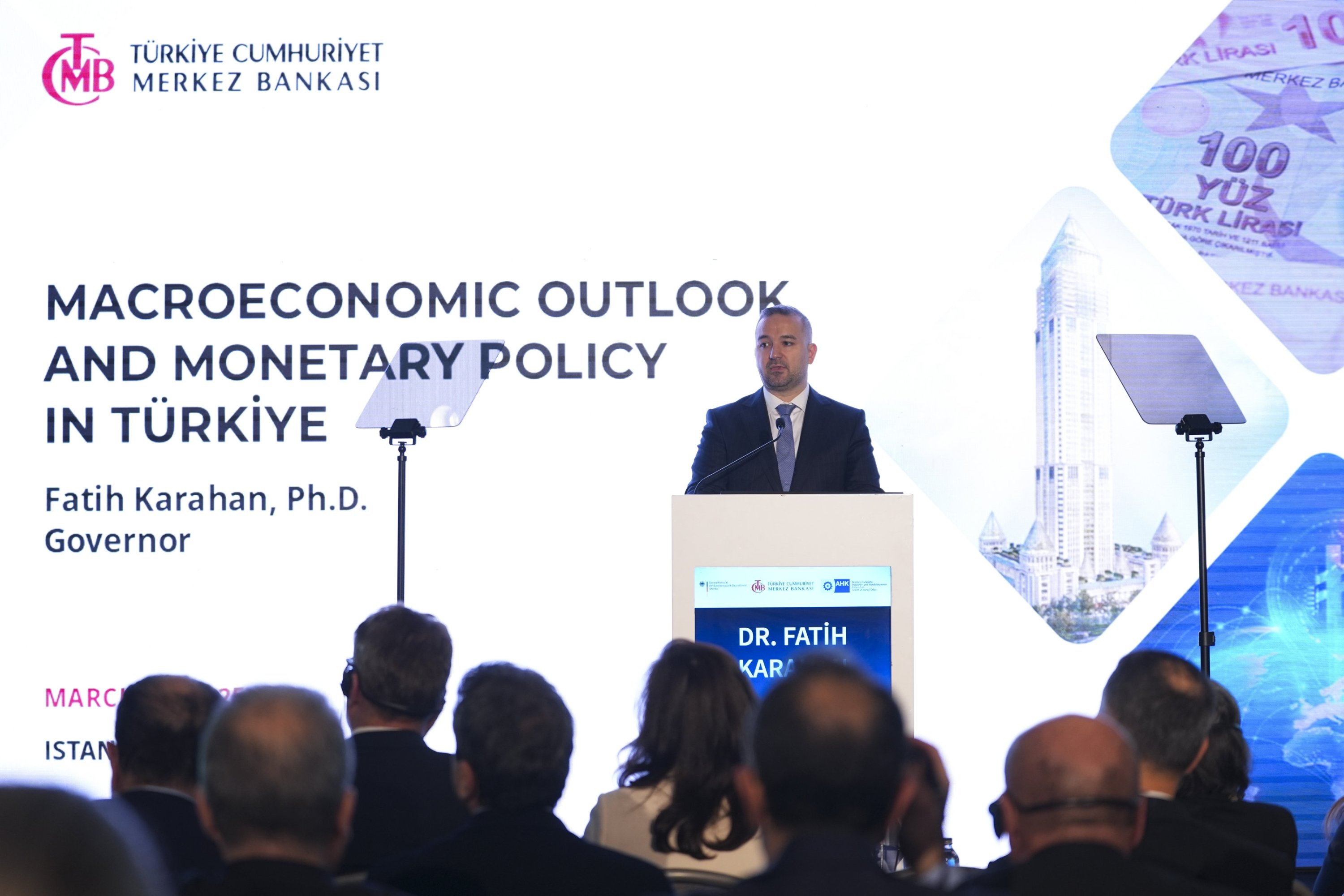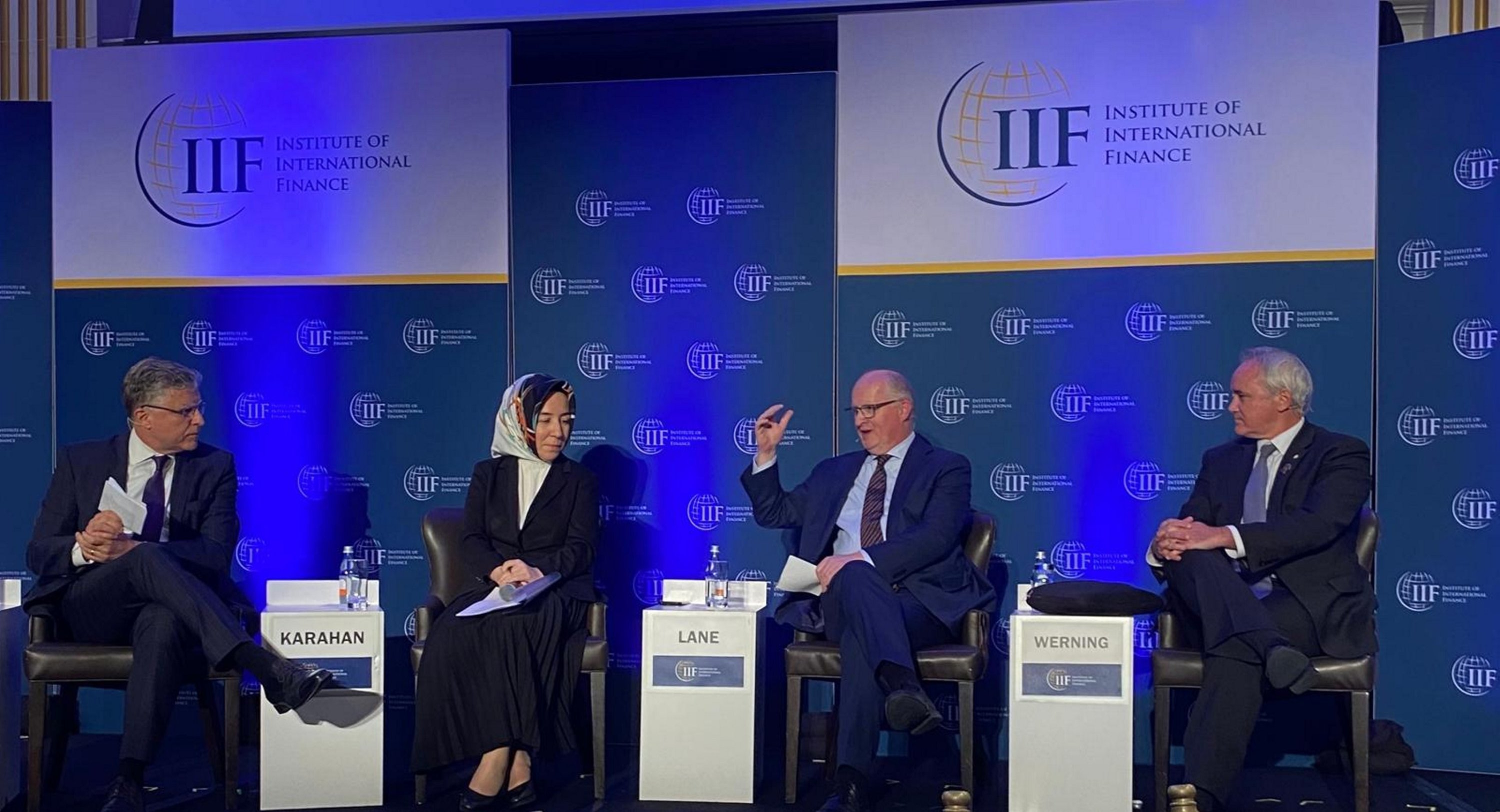© Turkuvaz Haberleşme ve Yayıncılık 2026
Disinflation in Türkiye continues, but risks "are alive," the governor of the central bank cautioned in his presentation on the economic outlook delivered in Washington on April 23.
The monetary policy has been "proactive," Central Bank of the Republic of Türkiye (CBRT) Governor Fatih Karahan said as part of his remarks during a presentation titled "Monetary policy and inflation outlook in Türkiye."
The key takeaways of the governor's speech were shared by the CBRT on Thursday.
Karahan, alongside Treasury and Finance Minister Mehmet Şimşek and other officials, is in Washington this week for the spring meetings of the International Monetary Fund (IMF) and World Bank.
Elaborating on disinflation, the governor maintained that it "continues," suggesting that the underlying trend has improved and the decline in services inflation is becoming more evident.
Turkish annual consumer price inflation continued a consistent downward trend as it slowed to 38.1% in March from a peak of around 75% last May, according to the official data.
The CBRT hiked its key policy rate to 46% earlier this month, reversing a short-lived easing cycle amid recent market volatility and growing global uncertainty in the face of tariffs imposed by the U.S. administration and the threat of an escalating trade war.
"There is uncertainty about the global macro outlook," Karahan reiterated in Washington.
While he highlighted that falling commodity prices would offset some of the exchange rate effects, and cited that a 10% decline in oil prices leads to a drop in inflation of around 1.0 percentage point, he suggested the impact on growth remains "highly uncertain."

"Goods inflation is low but will be affected by FX pass-through. Risks are alive," he also said.
"FX pass-through is expected to be around 35%-40%, considerably lower than that during the summer of 2023. Pass-through declined amid lower KKM balances, improved inflation expectations, and moderating demand."
He also suggested that FX-protected accounts (KKM) have declined "considerably."
On the question of whether demand is moderating, Karahan said that goods demand has been more resilient, while services demand is moderate, adding that policy "will facilitate further moderation."
He also suggested that card spending indicates a loss of momentum in demand.
Separately, CBRT Deputy Governor Hatice Karahan said on Wednesday that monetary policy tightness will be the main risk management tool to overcome the current volatility.
"The main thing here for us in this turbulent time is giving the message about our strong monetary policy stance," Karahan said at an Institute of International Finance (IIF) event on the sidelines of the IMF/World Bank meetings in Washington.
"The tightness in our monetary stance will be the main risk management tool for us to overcome these volatile times," she was quoted by Reuters as saying.

Karahan, who also touched on the impact of external developments, said: "The changing external environment creates new challenges for countries in terms of the monetary policy framework."
She noted that this situation is valid not only for Türkiye but also for all developing economies, but that, on the other hand, developing economies are better equipped against fluctuations today compared to the past.
"Türkiye, in particular, is better positioned against external shocks today. The current account deficit is quite low, and the external debt rollover ratio has improved significantly," Anadolu Agency (AA) quoted her as saying.
She also stated that they expect to see more support for the disinflation process on the fiscal policy side as well, and that the budget targets foreseen in the medium-term program are positive in this sense.
On Tuesday, the IMF lowered its forecast for global economic growth for this year and next, citing century-high tariffs in the United States and the prospect of a trade war. It, however, slightly upgraded its expectations for the growth in Türkiye.
Answering a question about tariffs, Hatice Karahan stated that the tariffs announced by the U.S. for Türkiye are at the lowest level compared to other countries, and that their analyses show that Türkiye has the potential to increase its share in the U.S. market.
On the import side, she suggested that the decline in commodity prices, especially oil prices, is positive for Türkiye and noted that such developments can reduce Türkiye's import bill.
"In an environment where uncertainty is so high, it is difficult to fully estimate the potential effects. However, the effects of the global trade policies implemented recently will be relatively limited in terms of Türkiye's current balance. However, capital flows are an important issue; this poses a risk for all developing economies. Therefore, we are monitoring it carefully."
The Turkish central bank has pledged to tighten its monetary stance "in case a significant and persistent deterioration in inflation is foreseen," and to adjust the policy rate prudently on a meeting-by-meeting basis with a focus on the inflation outlook.
